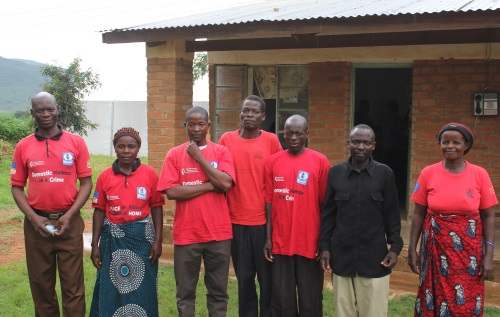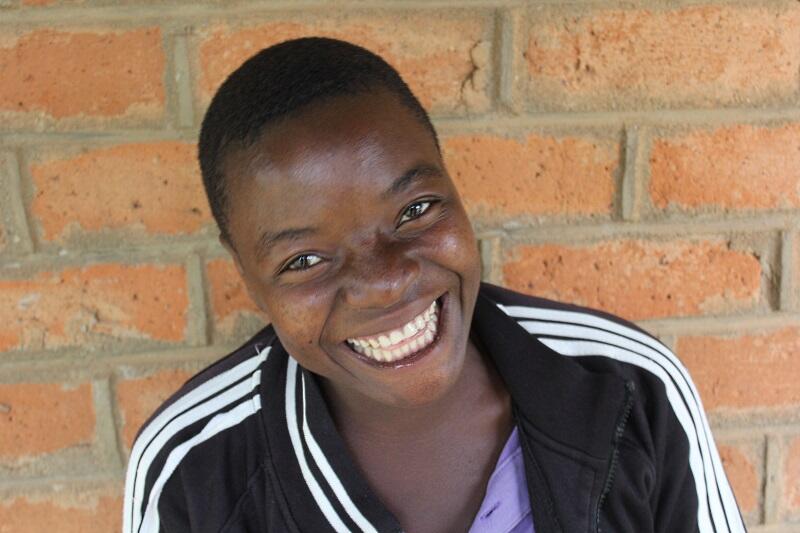KAMEME, Chitipa District, Malawi – For two years, Kisa Kaisi’s life looked particularly bleak. The last born of six children, she dropped out of school due to pregnancy in Standard 7. She was just 13 years old. Kisa gave birth to a girl she named Lucy and a year later, she married the child’s father, Samuel Mwapashi.
For two years they stayed together but she found herself a victim of gender-based violence. They struggled to make ends meet and finally, she decided to leave her husband and return to her parents’ house in Kameme.
It was here that Kisa was approached by volunteers of the Kameme Gender Equality and Women's Empowerment (GEWE) network, who talked to her about going back to school. She was young and they recognised that she had the potential to realize a better future.
I want to tell other girls not to be cheated like I was. I experienced a lot of problems when I got married.
– Kisa Kaisi, 16
Back to school
Kisa agreed to restart her schooling. Now 16 years old, she is in Standard 8 at Ilengo Primary School in Kameme.
“I want to tell other girls not to be cheated like I was. I experienced a lot of problems when I got married and they should not fall into that situation,” she says.
The men and women in the Kameme GEWE network of volunteers work with local leaders to help reduce child marriage and encourage girls to stay in school. The network identifies girls who have dropped out of school due to early marriage or pregnancy and encourage them to continue with their education.
Child marriage linked to abuse
By age 18, about half of all girls in Malawi are married and one in four adolescent girls already have a child. Most of the girls who marry early suffer abuse in their partnerships, including economic abuse, as they are married either to young men who have no means to support their family, or they are taken on as a second or third wife, which means competing for a share of his resources and support.
The community has been very supportive in informing us if there is an incident of child marriage or a girl dropping out of school. – Shenton Kalua, Chairperson of Kameme GEWE network of volunteers

© UNFPA / Henry Chimbali
“Since we started our work, we have managed to rescue 39 girls from early marriage (before being married); we have helped 20 girls withdraw from marriage (after marriage) and 123 girls return to school (after dropping out for various reasons, including marriage). This community has been very supportive in informing us if there is an incident of child marriage or a girl dropping out of school,” says Shenton Kalua, the Chairperson of Kameme GEWE network of volunteers, and a medical technician at Kamene Health Centre.
The network has been vigilant in its work. The girls who returned to school have remained in school; six girls have graduated from secondary school and two have also qualified for professional courses.
Established in 2013, the Kameme GEWE network of volunteers is also involved in reducing cases of child trafficking and defilement (under-age sex), with the members reporting any such cases to the police. More than 50 girls have been rescued and withdrawn from child marriage, while 12 cases of defilement and rape have been lodged with the police.
GEWE in Malawi
Since 2012, the European Union and UNFPA, the United Nations Population Fund have been supporting the Ministry of Gender, Children, Disability and Social Welfare to coordinate implementation of the GEWE Programme. It supports the government’s commitment to reduce gender inequalities between women, men, girls and boys in accessing productive resources and development opportunities. It also promotes decision-making to contribute positively to the Malawi Growth and Development Strategy II.
Girls in Malawi face a myriad interrelated challenges – social, economic, protective and health – that inhibit their access to education. In 2012, 58 per cent of girls dropped out of school and of those remaining, 18 per cent became pregnant and 8 per cent got married, according to data from the National Statistics Office.
Less than 25 per cent of girls finish primary school. The low retention rate is largely attributed to harmful cultural practices (such as initiation ceremonies at which girls are encouraged to experience sex, which may lead to pregnancy), lack of age-appropriate reproductive health information and knowledge, and poor use of health services. If readily available, these services could assist in reducing school drop-out by preventing pregnancy and reducing the transmission of sexually transmitted diseases, including HIV.
Today, Kisa is grateful for the Kameme GEWE intervention. Since she was helped back into the schooling system she has flourished: “I am doing well in school, based on my recent results. I want to be a nurse when I finish school. I want to be an example to other young girls,” she says.
By Henry Chimbali



